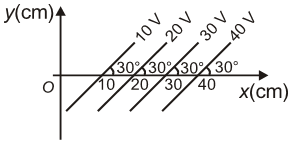\(\mathrm{A}\), \(\mathrm{B}\) and \(\mathrm{C}\) are three points in a uniform electric field. The electric potential is:
| 1. | maximum at \(\mathrm{A}\) |
| 2. | maximum at \(\mathrm{B}\) |
| 3. | maximum at \(\mathrm{C}\) |
| 4. | same at all the three points \(\mathrm{A},\mathrm{B} ~\text{and}~\mathrm{C}\) |
| 1. | \(8\) along the negative \(X\text-\)axis |
| 2. | \(8\) along the positive \(X\text-\)axis |
| 3. | \(16\) along the negative \(X\text-\)axis |
| 4. | \(16\) along the positive \(X\text-\)axis |
The electric potential at a point in free space due to a charge \(Q\) coulomb is \(Q\times10^{11}~\text{V}\). The electric field at that point is:
1. \(4\pi \varepsilon_0 Q\times 10^{22}~\text{V/m}\)
2. \(12\pi \varepsilon_0 Q\times 10^{20}~\text{V/m}\)
3. \(4\pi \varepsilon_0 Q\times 10^{20}~\text{V/m}\)
4. \(12\pi \varepsilon_0 Q\times 10^{22}~\text{V/m}\)
The figure shows some of the equipotential surfaces. Magnitude and direction of the electric field is given by:

| 1. | \(200\) V/m, making an angle \(120^\circ\) with the \(x\text-\)axis |
| 2. | \(100\) V/m, pointing towards the negative \(x\text-\)axis |
| 3. | \(200\) V/m, making an angle \(60^\circ\) with the \(x\text-\)axis |
| 4. | \(100\) V/m, making an angle \(30^\circ\) with the \(x\text-\)axis |
| a. | the electric field is uniform |
| b. | the electric field is zero |
| c. | there can be no charge inside the region |
| d. | the electric field shall necessarily change if a charge is placed outside the region |
Choose the correct statement(s):
1. (b) and (c)
2. (a) and (c)
3. (b) and (d)
4. (c) and (d)
The variation of potential with distance \(x\) from a fixed point is shown in the figure. The electric field at \(x=13\) m is:
| 1. | \(7.5\) volt/meter | 2. | \(-7.5\) volt/meter |
| 3. | \(5\) volt/meter | 4. | \(-5\) volt/meter |




